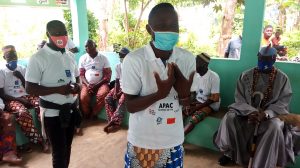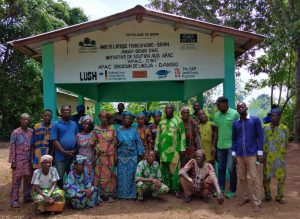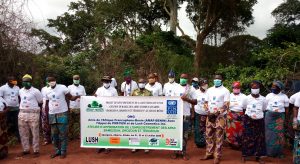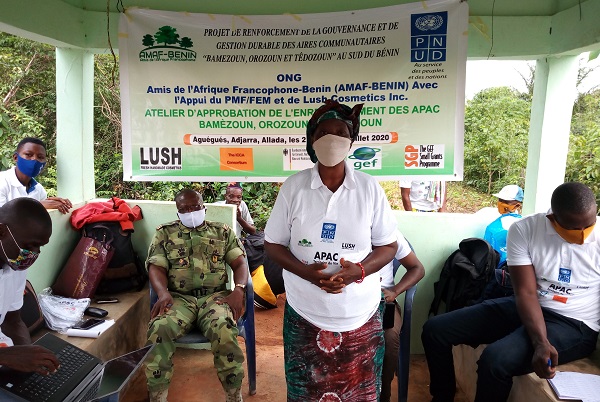First published on 07/23/2020, and last updated on 09/04/2020
By Fataï Aina of Amis de l’Afrique Francophone – Bénin (AMAF-Benin), ICCA Consortium Member.
AMAF-Benin (ICCA Consortium Member) organised several community dialogue and peer review workshops, during which the custodians of the Bamezoun, Orozoun and Têdozoun ICCAs agreed to submit them to the global ICCA Registry and the World Database on Protected Areas.
The communes of Allada, Adjarra and Aguégués hosted community dialogue and peer reviews on 21, 22 and 23 July 2020.
These activities were a major step forward in the Project for Integrating Sacred Forests into the Protected Areas System (PIFSAP), which was launched by the Beninese Government and the United Nations Development Programme (UNDP). They were carried out in implementation of the “Strengthening Governance and Sustainable Management of Bamézoun, Orozoun and Têdezoun Community Areas in Southern Benin” project, led by AMAF-Benin with technical and financial support from the Global Environment Facility (GEF) microfinance programme and Lush Cosmetics, Inc./Lush Charity Pot. They were organised as part of the ICCA Global Support Initiative (ICCA-GSI).
The aim was to promote the recognition and long-term protection of biological and cultural resources in the Bamézoun, Orozoun and Têdozoun ICCAs as well as to strengthen their contribution to conservation and ensuring the means of subsistence for Benin’s Alladahonou, Nago and Wémènou Indigenous peoples and other local communities.
Difficulties faced by ICCAs in Benin
Throughout the country, and particularly in rural areas, ICCAs are in a highly worrisome state of degradation due to agriculture and urbanisation, both of which pose a serious threat to the future of their biological resources. Though ICCAs remain the places where biodiversity has been best preserved, human pressure on them is increasing. The power of traditional leaders and voodoo practitioners within ICCAs has decreased considerably, leaving the territories vulnerable to unregulated exploitation and other forms of destruction.
That is why AMAF-Benin, which works to promote ICCAs with support from the GEF small grants programme, is helping to develop ways to protect sacred forests and strengthen their traditional practices so as to safeguard and restore biodiversity.

A peer shares his opinion on the willingness of communities to register the Orozoun APAC within the International ICCA Registry and the World Database on Protected Areas (WDPA) © AMAF-Benin.
Importance and advantages of registering ICCAs
Registering the Bamézoun, Orozoun and Têdozoun ICCAs within the WDPA will benefit not only the custodian communities themselves, but also people living in the communes of Allada, Adjarra and Aguégués, and even the country as a whole.
Indeed, the productive landscapes of Bamézoun, Orozoun and Têdozoun offer safe havens for a number of species, some of which – such as pollinating insects, birds, and plants grown to form barriers and hedgerows – are themselves beneficial to the surrounding farmland.
These three ICCAs thus act as in-situ plant nurseries and genetic reservoirs. Some species of flora found in or near ICCAs are vulnerable or threatened.
ICCAs are also places where communities’ cultural values are preserved. Their landscapes have been carefully managed for decades, even centuries.
Last but not least, these three ICCAs provide ecological and socioeconomic benefits that extend beyond the territories themselves. In addition to their spiritual and religious value, they provide protection for water sources, constitute carbon sinks and barriers against soil erosion, and have potential as ecotourism destinations.
Community dialogue: a way to share and exchange about registering ICCAs
Once the consent of the Indigenous and local communities was obtained, AMAF-Benin began the registration process established by the ICCA Consortium and the UN Environment Programme World Conservation Monitoring Centre (UNEP-WCMC). Stakeholders in biodiversity and environmental conservation were invited to participate as peers; these included civil society organisations (including ICCA Consortium Members in Benin), the Beninese Forestry Administration, representatives of the neighbouring communes and Benin’s national ICCA network. The peer organisations reviewed and approved the registration of the three ICCAs within the WDPA.
All representatives present from each of the newly registered ICCAs were given the chance to voice their views regarding the community’s willingness to register their ICCA.
The peer organisations all agreed they were making the right decision in the interest of promoting the ecological and cultural value of ICCAs. The dialogue sessions also provided an opportunity to share the history of the ICCAs under review.
Each session produced a written record of approval signed by all participants. It should be noted that before the sessions took place, the following important steps had already been taken:
- The custodian communities had formed governing councils made up of Indigenous and local inhabitants;
- Free, prior and informed consent had been obtained from the communities and recorded on documents signed and dated by the leadership of the ICCA governing councils;
- The ICCAs had been officially recognised by the communal authorities in accordance with Interministerial Order No. 0121/ MEHU/ MDGLAAT/ DC/ SGM/ DGFRN/ SA, which establishes the conditions for sustainable management of sacred forests in the Republic of Benin; and
- Official authorisation had been received from the mayors of the communes in which the three ICCAs are located.
Encouraging results
The dialogue sessions produced three important successes:
- Communities, NGOs and local and administrative authorities gained better knowledge of the resources contained within the ICCAs;
- The custodian communities gained confidence and power to help them to continue defending their territories of life; and
- The Bamézoun, Orozoun and Têdozoun ICCAs were recognised as protected areas, and their registration within the WDPA was approved.
AMAF-Benin’s plans following the community dialogue
Now that the community dialogue sessions have been completed, AMAF-Benin plans to:
- Continue finalizing the registration procedures for the three ICCAs;
- Strengthen the capacity of the ICCA governing councils in terms of managing protected community areas;
- Raise awareness about the new status of the three ICCAs; and
- Promote climate action; specifically, strengthening capacities and social and climate resilience among the Indigenous communities who depend on ICCAs; to help them generate climate solutions, by providing them with tools, training and resources so that their traditional knowledge can produce climate solutions for all.
Lastly, AMAF-Benin plans to continue working to support other ICCAs in Benin.

Group photo after a community meeting in Adjarra ©AMAF-Benin.
Building the confidence and power of Indigenous peoples and local communities
One lesson learnt was that community dialogue on the situation of ICCAs is beneficial to Indigenous peoples and local communities and strengthens their confidence and governance power.
Indigenous peoples and local communities require moral, technical and scientific support to better protect and conserve their ICCAs. They feel reassured when they receive external support in their fight to defend their territories of life.
Another lesson learnt was that dialogue among Indigenous/local communities and development actors, including the local and administrative authorities, contributes to the strengthening of these communities’ traditional knowledge, which in turn helps in the fight against climate change and the destruction of biodiversity.
Lastly, it became clear throughout the registration process that proper recognition of ICCAs helps to advance conservation efforts and the sustainable management of biodiversity, the protection of traditional values and the long-term maintenance of means of subsistence for these communities.
The case of Têdozoun
The Têdozoun ICCA was able to escape destruction at the hands of urban developers thanks to having been officially recognised by communal order. Part of the territory had been divided up and sold to third parties. When the buyers noticed restoration efforts being taken in the territory, they burned down the section that they had bought.
As soon as we were notified, AMAF-Benin reported the incident to the Allada communal authorities and the Atlantic Forestry Inspector. The authorities took action against the buyers and prohibited all external interference in the ICCA. They also made it known that the Têdozoun ICCA is a community heritage site belonging to the Alladahonou people and officially recognised as such by communal order.

Group photo after the community dialogue held in Allada © AMAF-Benin.
To learn more, visit the Bamézoun, Orozoun and Têdozoun pages on the International ICCA Registry’s official website.
Featured image: Sharing the experience of a local organisation on community management of an emblematic APAC © AMAF-Benin.
Translation from French: Margaret Besser.
